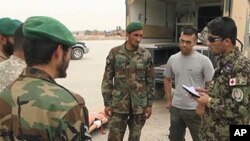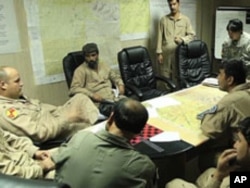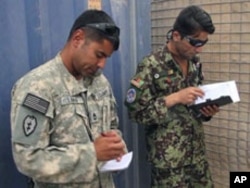The United States military is helping build an Afghan Air Force - training pilots, flight medics and mechanics. The goal is to prepare the Afghan Air Force to support ground troops and allow U.S. and coalition forces to take a step back from the front line.
United State Air Force Major Micah West is one of three Americans helping train Afghan pilots in the southern province of Kandahar. He is one of the aviators that are part of the 738th Air Expeditionary Advisory Group, which is helping develop the Afghan Air Force here. Afghanistan's military will need its own air capabilities before it can take control of the country's defense.
"You need competent helicopter pilots because of the way the country is built," said West. "There is very limited infrastructure as far as roads go, there is only one big highway which goes all around the place, and it's obviously easy for people to target that."
Before each flight, the unit discusses the flight plan. Translators bridge the language barrier. Instructors want to instill a flight culture similar to that of the United States - one of safety and planning.
"It's not going to do any good if we secure them here for two years," said West. "We have to make them, we have to help them, set up a system which will work, you know, long-term whether we are here or not."
Sergeant First Class David Lara is putting flight medics through their paces. He assesses the recruits, judging their level of medical experience.
"The medical is a big piece because you have ground medics, or ground personnel, that if they get hurt, and if they know that no one is going to come and pick them up they are not going to want to fight, they are not going to fight 100 percent," said Lara. "But if they understand that if something happens and they get hurt, there is somebody out there that is going to pick them up, then that is a big morale booster for the ground forces."
Lara tries to keep the training positive and encourages the soldiers at every step.
Sergeant Hayatullah Bahar Jawazjani has been in the Afghan Air Force for four years and has worked with Sergeant Lara for the past six months. Jawazjani has taken on a leadership role in training his compatriots.
"There has been fighting my country for a very long time," said Jawazjani. "So I joined the military to try and help my country and I became a medic to help with these disasters."
This is the only mentoring unit for the Afghan Air Force in Kandahar at the moment. The 18-month-old program is limited to helicopters for now, but there are plans to include airplanes in the future. The U.S military considers programs like this integral to the long-term success of the Afghan military and the country's future.






